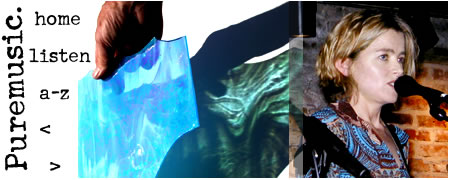
A Conversation with Anne McCue (continued)
PM: How do you see yourself? Do you see yourself as like a singer/songwriter person? I mean, all those terms are such bullshit in a way, but I mean, what's your vision of yourself at this point, musically?
AM: I struggle to categorize what I'm doing--one minute I'll write a waltz folk song, and the next minute it'll be a blues song, and then just a pop song. I find it really hard to describe what I'm doing, and to pinpoint where I'm coming from.
PM: But even though you're not terribly on the folky side, whatever the hell that means these days, in essence you are a singer/songwriter. Although you're a really good guitar player, you're a singer/songwriter.
AM: That's the thing, I'm definitely not just a songwriter, because I can't really get into that idea of trying to write a hit song. You know, I've tried to kind of co-write in that way with people who just--
PM: With people who do that?
AM: Yeah, people who write songs and have hits. But it's just not me. I can't write a song that I can't sing. I couldn't write a song that I wouldn't want to sing myself. Even though I've tried to, I can't.
PM: That's an important distinction, I think.
AM: I would love it if people sang my songs, you know.
PM: Has anybody covered any of your tunes yet?
AM: There's this group in Ireland called Shimoon, and they've recorded one of my songs. And it's coming out in March on RCA.
PM: And where are they from, Dublin or Galway?
AM: I think they're from Dublin, but it might even be Belfast. I'm not sure. They're these two girls with really sweet Irish soprano voices. And a guy called Paul Schwartz produced the album, and he's really a great producer. So that's the first. I've heard of other people who like to sing them live, but that's the first recording.
PM: That's a big deal.
AM: Yeah.
PM: So when the songs on Amazing Ordinary Things don't concern some aspect or a situation of love, they are, in one way or another, about spirituality.
AM: Uh-huh.
PM: Last night you referred to a ten-day meditation retreat you'd gone on. What are your inclinations or your aspirations in the spiritual realm?
AM: Well, the thing was that I wanted to change my life. I was kind of sick of drinking. And I used to smoke cigarettes. I got to a point where I got so bored with it all, and I wanted to change. And I went on this retreat. It was a Buddhist retreat. And I was able to just change my whole life.
PM: Whose retreat was it?
AM: Well, it's called Vipassana. What they teach you is the original teachings of Buddha, which had nothing to do with religion. Like he never spoke about God or religion.
PM: It's a mindfulness deal.
AM: Yeah. You spend three days concentrating on the breath coming in and out of the nostrils, [laughs] and for eleven hours a day. It's excruciating. But then you move on to Vipassana, which is concentrating on the sensations of the body from the head to the toes and back up. And you just go up and down all, all day. But the idea is that instead of paying attention to the mind which is constantly causing you anxiety and trouble, rambling on and on and on and distracting you from reality, you know, distracting you from now, instead you're concentrating just on the body, which is experiencing every moment. You know what I mean? So it relieves you from all of the troubles that are going on in your head all the time.
PM: And tries to break that connection between you and endless fascination with the avenue of the mind's bullshit.
AM: Yeah, which is always concerned with the past and the future, you know, two things you can't change. You can direct your future, but you're usually worrying about some things that never happen. So that's all it is. It's not about God or religion or anything, it's just a meditation technique.
PM: Right.
AM: And that's all they talk about. That's all they teach. And I think for anyone to do it once is just good, because it gives you--I've been much more focused on music. I'm just much more focused on the important things.
PM: Was that in California, or where did you do it?
AM: The first time, I did it in Sydney, in the Blue Mountains there. And I have done it in California, too. So you know, I don't kill ants or insects or anything. I eat fish, but I try not to eat it very much. I don't eat any other meat.
PM: No poultry.
AM: No, and no beef, just fish. So in that sense, I'm fairly Buddhist. I mean, if I was a vegetarian, that would be better, but I find that's a little bit drastic after being such a carnivorous--
PM: Food on the road is difficult enough.
AM: It's very difficult to find good food. But I try, in that sense, I have that philosophy, the Buddhist philosophy, without the religion, as such. You know what I mean?
PM: You're not a Tibetan or a Zen Buddhist, you're just practicing a meditation technique.
AM: Exactly. continue
print (pdf) listen to clips archives puremusic home